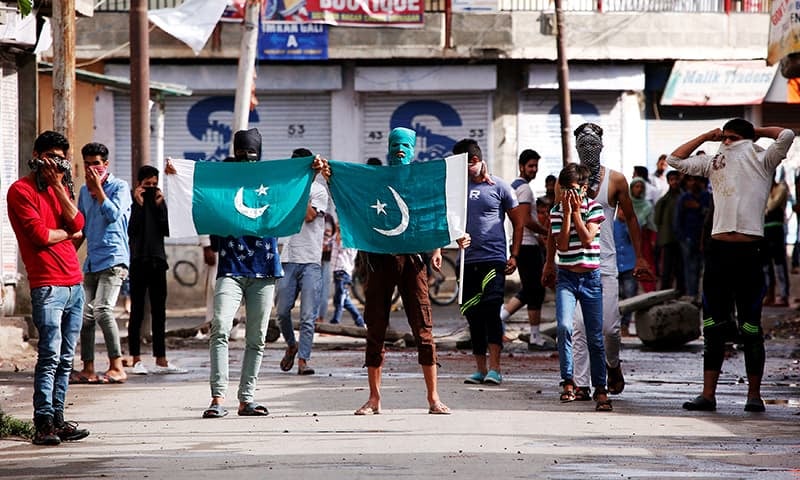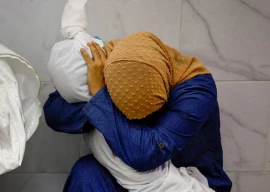
KARACHI: Civilian authorities in Pakistan have managed to maintain effective control over security forces in the last few years as orderly transitions in top political and military leadership helped solidify the democratic process in the country, according to a recently released report on Human Rights Practices by the State Department of the United States.
The report released on Friday was severely critical of the condition of basic human rights in Pakistan over the past year, attributing widespread rights violations to terrorist violence and abuse by non-state actors within the country. The authors of the study concluded that a lack of government accountability, in which abusers often go unpunished, is responsible for festering a culture of impunity among perpetrators.
However, the findings praised Pakistan for sustained and significant operations against militant groups inside the country over the past twelve months which have contributed to a reduction in violence, as fatalities from terror-related incidents reduced from 1,803 in 2016 to 1,084. Legislative efforts and amnesty offers which aim to integrate rebellious or marginalised groups back within the national fold, particularly in Balochistan, were appreciated in the report.
HRCP slams ‘burglary-style raid’ on editor’s house
According to the study published by the Bureau of Democracy, Human Rights and Labour at the US State Department, the most serious incidents related to abuses within Pakistan in 2017 were extra-judicial and targetted killings. In addition to these problems, corruption within the government and police, lack of criminal investigations or accountability for cases related to rape, ethnic and religious violence, and labour rights remained areas of considerable concern for the international community.
Extra-judicial or targetted killings
The report listed several cases of extra-judicial and targetted killings across the country, some of which have sparked outrage and protests in parts of Khyber-Paktunkhwa and Federally Administered Tribal Areas.
For example, it identified the Parachinar incident of 2017, in which firing on a local protest by law-enforcement authorities prompted a rare internal investigation, as well as the removal of a top official, by the government.
The study cited South Asia Terrorism Portal as reporting that at least 183 civilians were killed in terrorist attacks in Balochistan in 2017, compared to about 251 deaths to such incidents in 2016. Militants and terrorist groups killed hundreds and injured thousands with bombs, suicide attacks, and other violence during 2017, targetting police and security forces in particular, the report highlighted.
Enforced disappearances
The case of the missing bloggers has been listed as the most high-profile incident of enforced disappearances inside Pakistan during 2017.
According to a government-constituted Commission of Inquiry on Enforced Disappearances, headed by Justice (retired) Javed Iqbal, 4,608 cases of missing persons or enforces disappearances were reported to the inquiry team between 2011 and 2017. The report stated that the government claimed 3,076 of these have now been closed, while 1532 remain open.
Outdated laws main hurdle in speedy dispensation: CJP
Data obtained by the commission appeared to show that most of the missing persons were from the province of Khyber-Pakhtunkhwa (751), followed by Punjab (245), Balochistan (98), Sindh (50), Federally Adminstered Tribal Areas (48), the Islamabad (45), Azad Jammu and Kashmir (14), and Gilgit Baltistan (5).
Torture and state of prisoners
The report underlined that the Constitution of Pakistan does not provide legislative cover against torture of detainees by law-enforcement agencies, and a lack of complaint sections which deal with this issue exacerbated the problem.
According to the Asian Human Rights Commission, police in Pakistan committed an excessive abuse of detainees in at least 114 cases in 2017, compared with more than 147 cases in 2016. Cases of deaths and horrific injuries during detention often went unreported, the report noted.
The US State Department appreciated amendments made to the tribal laws which exclude women, children and older people from collective punishment.
The report gave a grim overview of prisons in Pakistan, as poor physical facilities, torture, corrupt administrations and lack of independent monitors contribute to harsh and life-threatening conditions inside detentions centres.
Overcrowding, food and health facilities, prison security, treatment of prisoners belonging to a religious minority, treatment of women prisoners, and the corrupt practices of prison administrations are some of the problems highlighted in the report which require immediate attention of the provincial authorities in Pakistan, as they are primarily responsible for managing prisons.
In a startling revelation, the report cited the Society for Human Rights and Prisoners Aid in the country as estimating that the total number of prisoners in the country was more than 100,000, while the total capacity of prisons stood at just 36,000. Also, non-government organisations reported that the province of Balochistan had no separate prison for female detainees, although barracks in Quetta and Khuzdar temporarily compensated for the lack of it.
Religious and ethnic violence
Militant and terrorist activity was responsible for most of the religious and ethnic violence in Pakistan during 2017, the study by the US State Department underlined. There were a number of bomb and gun-attacks on civilians, journalists and security forces over the year based on ethnic or religious tensions.
International moot on Human Rights concludes
According to the South Asia Terrorism Portal, there were 15 sectarian attacks in 2017 reported across Pakistan which resulted in the death of 229 individuals, compared to 132 deaths in 31 such incidents in 2016.
Press and internet freedom
The report heaped lavish praise for the media in the country, stating that journalists were active and free to express their views on a wide variety of issues, including criticism of the government. The press reported on ethnic and religious violence, as well the persecution of minorities, but refrained from addressing other, more sensitive issues.
The government of Pakistan has been accused of implementing a systematic, nationwide content monitoring and filtering system to restrict or block unacceptable content on the internet. According to Freedom House, 200,000 websites were blocked in Pakistan in 2017, and the government also contacted international social media giants to obtain information about individuals posting content deemed inappropriate to the state in order to persecute them.
International non-governmental organisations and refugees
The report has lashed out the policies of the government in Islamabad which require international humanitarian organisations to obtain no-objection certificates for most of the projects they are working on, contending that the policy is responsible for the steady erosion of freedom for these charities to work for the welfare of communities across Pakistan.
Late last year, the government requested the closure of a number of international charities within 60 days, without citing reasons behind the move. The procedure for an appeal to circumvent this order is opaque, according to the report.
On the topic of refugees in the country, the US State Department commended the decision of authorities in Pakistan to provide temporary legal status to almost 1.4 million Afghan refugees. But Afghans continued to face harassment at the hands of provincial governments and the police, the report noted.
Figures released by the United Nations indicated that there were 3,345 arrests and detentions of refugees during 2017. All those arrested were released later, 76 per cent without charges, often following the intervention of the UN.


































































COMMENTS
Comments are moderated and generally will be posted if they are on-topic and not abusive.
For more information, please see our Comments FAQ